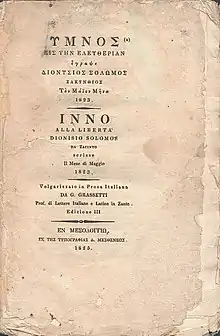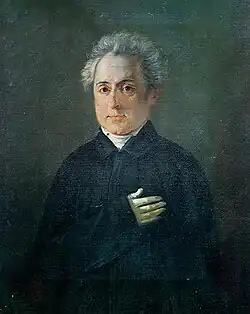Hymn to Liberty
The "Hymn to Liberty", or "Hymn to Freedom" (Greek: Ὕμνος εἰς τὴν Ἐλευθερίαν,[lower-alpha 1] also Ὕμνος πρὸς τὴν Ἐλευθερίαν),[lower-alpha 2] is a poem written by Dionysios Solomos in 1823 that consists of 158 stanzas and is used as the national anthem of Greece and Cyprus. It was set to music by Nikolaos Chalikiopoulos Mantzaros in 1865 and is the longest national anthem in the world by length of text.[1][3] It officially became the national anthem of Greece in 1865 and Cyprus in 1966.[4][5][6]
| English: Hymn to Liberty | |
|---|---|
| Ὕμνος εἰς τὴν Ἐλευθερίαν Ὕμνος πρὸς τὴν Ἐλευθερίαν | |
 | |
National anthem of Greece and Cyprus | |
| Lyrics | Dionysios Solomos, 1823 |
| Music | Nikolaos Chalikiopoulos Mantzaros, 1865 |
| Adopted | 1865 (by Greece)[1] 1966 (by Cyprus)[2] |
| Audio sample | |
U.S. Navy Band instrumental version
| |
History

Dionysios Solomos wrote "Hymn to Liberty" in 1823 in Zakynthos, and one year later it was printed in Messolonghi. It was set to music in 1865 by the Corfiot operatic composer Nikolaos Chalikiopoulos Mantzaros, who composed two choral versions, a long one for the whole poem and a short one for the first two stanzas; the latter is the one adopted as the national anthem of Greece. "Hymn to Liberty" was adopted as the national anthem of Cyprus by order of the Council of Ministers in 1966.[7]
Lyrics

Inspired by the Greek War of Independence, Solomos wrote the hymn to honour the struggle of Greeks for independence after centuries of Ottoman rule.[8][9][10]
"Hymn to Liberty" recounts the misery of the Greeks under the Ottomans and their hope for freedom. He describes different events of the War, such as the execution of Patriarch Gregory V of Constantinople, the reaction of the Great Powers, extensively the Siege of Tripolitsa and the Christian character of the struggle.
Greek original
The following are the first 8 verses of the anthem. Only the first two constitute the de facto national anthem of Greece.
| Greek original[11][12][13] | Transliteration | IPA transcription[lower-alpha 3] | Poetic English translation[14][15] (Rudyard Kipling, 1918) |
Literal English translation[16] |
|---|---|---|---|---|
1.Σε γνωρίζω από την κόψη |
Se gnorízo apó tin kópsi |
[se‿ɣno.ˈɾi.zo‿a.ˈpo tiŋ‿ˈɡop.si] |
We knew thee of old, |
I know you from the blade |
Uses
An adapted version was used during the short-lived Cretan State as the Cretan Anthem. The "Hymn to Liberty" had been the Greek royal anthem after 1864.
"Hymn to Liberty" has been the national anthem of Cyprus since 1966.[2]
"Hymn to Liberty" has been performed at every closing ceremony of the Olympic Games, to pay tribute to Greece as the birthplace of the Olympic Games.
The version commonly played by military bands is an arrangement composed by Lieutenant Colonel Margaritis Kastellis (1907–1979), former director of the Greek Music Corps.[24]
Notes
- Hýmnos is tin Eleftherían, pronounced [ˈimnos is tin elefθeˈri.an].
- Hýmnos pros tin Eleftherían, pronounced [ˈimnos pros tin elefθeˈri.an].
- See Help:IPA/Greek and Modern Greek phonology.
- Sometimes written κόκαλα,[17] a more modern form.
- Written variously, including as να 'λθη[18] and νάλθη.[19] Έλθει is the modern formal third person singular perfective, also used in subjunctive compounds with να.
- Occasionally, the abbreviated variant κι is used.[12][13]
- Also written κλάυματα,[20] κλάηματα[21] and κλάματα.[22][23]
References
- Εθνικός Ύμνος [National Anthem] (in Greek). www.presidency.gr. Archived from the original on 3 May 2011. Retrieved 30 May 2011.
- "Presidency of the Republic of Cyprus – The National Anthem". Archived from the original on 3 May 2011. Retrieved 14 February 2011.
- "Greece: Hymn to Liberty". NationalAnthems.me. Retrieved 7 April 2017.
- Ηλίας Κανέλλης (25 September 2010). "Το μνημείο διατίθεται για διαδηλώσεις Η "χρήση" του Άγνωστου Στρατιώτη και... άλλες βέβηλες ιστορίες". Ta Nea.
Ο «Ύμνος προς την Ελευθερίαν» του Διονυσίου Σολωμού είναι, πρωτίστως, ένα ποίημα μέσω του οποίου υμνήθηκε το έθνος-κράτος, σε περίοδο που οι εθνικές οντότητες ήταν ταυτόσημες της νεωτερικότητας.
- Κωστούλα Τομαδάκη (22 November 2010). "Ο εθνικός ύμνος "ελεύθερος" στο Διαδίκτυο". To Pontiki.
Το 1865, μετά την ένωση της Επτανήσου με την Ελλάδα, ο «Ύμνος προς την Ελευθερίαν» καθιερώθηκε ως εθνικός ύμνος της Ελλάδας.
- Argolikos Archival Library of History and Culture (14 September 2012). "Εφημερίδα της Κυβερνήσεως – Το Ναύπλιον γενέθλιος πόλις της εφημερίδος της Κυβερνήσεως". Αργολική Αρχειακή Βιβλιοθήκη Ιστορίας & Πολιτισμού (Argolikos Archival Library of History and Culture.
Ας σημειωθή χαρακτηριστικώς, ότι η περί ης ο λόγος εφημερίς προέτεινεν εις το φύλλον της 21ης Οκτωβρίου 1825 την καθιέρωσιν ως εθνικού ύμνου του ποιήματος του Δ. Σολωμού «Ύμνος προς την Ελευθερίαν», του οποίου εδημοσίευσεν ανάλυσιν υπό του Σπ. Τρικούπη.
- "National Anthem". Archived from the original on 13 August 2011. Retrieved 3 June 2015.
- "Ύμνος εις την Ελευθερίαν". stixoi. Retrieved 8 August 2019.
- "Ύμνος εις την Ελευθερίαν". sansimera. Retrieved 8 August 2019.
- Papaloizos, Theodore (2009). Greek language, Modern. ISBN 978-0-932416-02-5. Retrieved 8 August 2019.
- Athene: The American Magazine of Hellenic Thought. Athene Enterprises, Incorporated. 1957. p. 3.
- "Ύμνος εις την Ελευθερίαν". Sansimera.
- "Διονύσιος Σολωμός, "Ο Ύμνος εις την Ελευθερίαν"". ebooks.edu.gr. Retrieved 4 January 2022.
- "The National Anthem". Presidency.gr.
- "Poem of the Day: Hymn to Liberty by Rudyard Kipling". HeraldScotland. Retrieved 30 December 2021.
- "National Anthems & Patriotic Songs - Greek & Cypriot National Anthem - Ýmnos is tin Eleftherían (long version) lyrics + English translation". lyricstranslate.com. Retrieved 19 January 2023.
- "Orthodoxy in Modern Greek Poetry". www.myriobiblos.gr. Retrieved 4 January 2022.
- Moleas, Wendy (25 March 2004). The Development of the Greek Language. Bloomsbury Academic. p. 84. ISBN 978-1-85399-675-7.
- Kolias, Nina K. (1997). The Greeks in Alberta, 1903–1995. N.K. Kolias. p. 13. ISBN 978-0-9681616-0-9.
- "Υμνος εις την Ελευθερίαν" (PDF). digital.mmb.org.gr. 1918. Retrieved 4 January 2022.
- Genikē anthologia: poiēseōs & pezographias (in Greek). S.D. Dēmētrakos. 1965. p. 219.
- "Σπουδαστήριο Νέου Ελληνισμού - Σολωμός Διονύσιος - Solomos". www.snhell.gr. Retrieved 30 December 2021.
- "Ύμνος εις την Ελευθερίαν". Stixoi.
- "National Anthem". Hellenic Army Academy. Archived from the original on 9 February 2015. Retrieved 30 January 2015.
External links
- Ύμνος εις την Ελευθερίαν: Scores at the International Music Score Library Project
- Short 30 min Version Full version Versions of the Hymn at YouTube
- The Greek Presidency – The website for the Presidency of the Hellenic Republic has a page about the National Anthem, including an instrumental file.
- Michał Bzinkowski, Eleuthería ē Thánatos!: The idea of freedom in modern Greek poetry during the war of independence in 19th century. Dionysios Solomos’ “Hymn to Liberty”
- Neugriechische Volksgesänge, Johann Matthias Firmenich
- The Hymn with all 158 stanzas (in Greek & English)
- From the Official Website of the Greek Presidential Guard
- The Greek national Anthem (in mp3)


